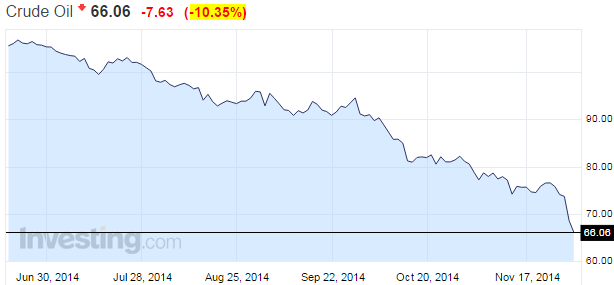Although OPEC’s decision to maintain current crude production quotas was not entirely unexpected (see post), the market reaction was violent. WTI crude fell by 10% over the last two days of the week.

At $66 per barrel North American producers have real problems on their hands. While Eagle Ford is still profitable, both Bakken and Permian Basin are in now the red.
Scotiabank: – Based upon an analysis of more than 50 oil plays across Canada and the United States, we estimate that ‘mid-cycle break-even costs’ in the North Dakota Bakken (1.05 mb/d) are roughly US$69 per barrel and in the Permian Basin in Texas (1.63 mb/d) about US$68. While some producers have hedged forward at higher prices, if WTI oil remains around US$70 for more than six months, it appears likely that drilling activity will slow in more marginal areas of these plays as 2015 unfolds. Funding for independent oil producers will also tighten. However, the ‘liquids-rich’ Eagle Ford (1.45 mb/d) will be little impacted, with break-even costs averaging only US$50.
That’s why we’ve had such an extreme sell-off in U..S oil & gas shares on Friday (see chart) and Canadian shares underperformed (see chart). If prices persist at current levels for months to come, the Saudis will achieve their objective of dealing a blow to North American oil production. Current expectations of the US outpacing Saudi Arabia as the number one oil producer (see chart) will be shelved for some time. And the only thing the US government could do at this point to support the domestic oil industry is to begin increasing the Strategic Petroleum Reserve. Of course such a measure would be temporary and if global demand does not improve, prices will begin falling again.













Leave A Comment